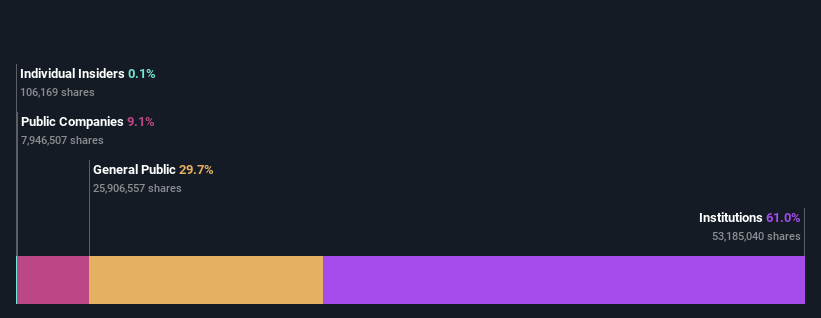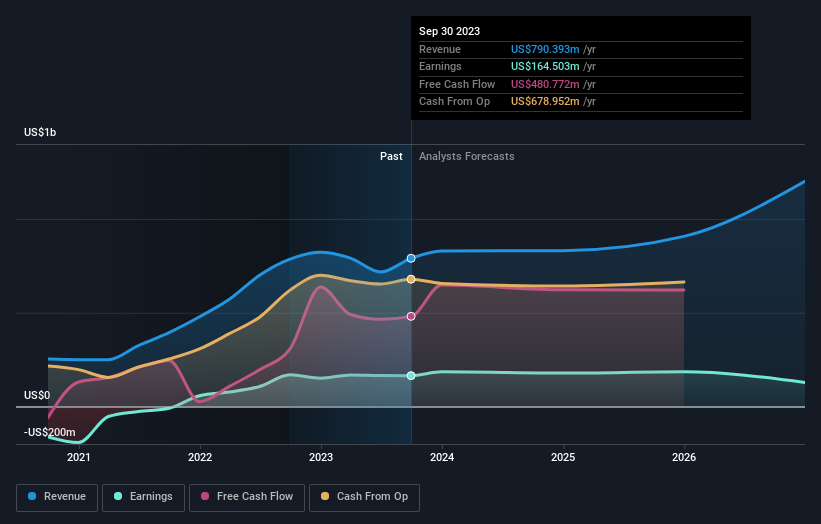A great week for institutional investors who own 61% of Viper Energy, Inc. (NASDAQ:VNOM)
Key Insights
Given the large stake in the stock by institutions, Viper Energy's stock price might be vulnerable to their trading decisions
A total of 6 investors have a majority stake in the company with 53% ownership
Ownership research along with analyst forecasts data help provide a good understanding of opportunities in a stock
To get a sense of who is truly in control of Viper Energy, Inc. (NASDAQ:VNOM), it is important to understand the ownership structure of the business. And the group that holds the biggest piece of the pie are institutions with 61% ownership. Put another way, the group faces the maximum upside potential (or downside risk).
Clearly, institutional investors benefitted the most after the company's market cap rose by US$104m last week.
Let's delve deeper into each type of owner of Viper Energy, beginning with the chart below.
Check out our latest analysis for Viper Energy
What Does The Institutional Ownership Tell Us About Viper Energy?
Many institutions measure their performance against an index that approximates the local market. So they usually pay more attention to companies that are included in major indices.
As you can see, institutional investors have a fair amount of stake in Viper Energy. This suggests some credibility amongst professional investors. But we can't rely on that fact alone since institutions make bad investments sometimes, just like everyone does. If multiple institutions change their view on a stock at the same time, you could see the share price drop fast. It's therefore worth looking at Viper Energy's earnings history below. Of course, the future is what really matters.
Institutional investors own over 50% of the company, so together than can probably strongly influence board decisions. We note that hedge funds don't have a meaningful investment in Viper Energy. Looking at our data, we can see that the largest shareholder is Wellington Management Group LLP with 15% of shares outstanding. The Vanguard Group, Inc. is the second largest shareholder owning 14% of common stock, and Diamondback Energy, Inc. holds about 9.1% of the company stock.
We did some more digging and found that 6 of the top shareholders account for roughly 53% of the register, implying that along with larger shareholders, there are a few smaller shareholders, thereby balancing out each others interests somewhat.
While studying institutional ownership for a company can add value to your research, it is also a good practice to research analyst recommendations to get a deeper understand of a stock's expected performance. There are plenty of analysts covering the stock, so it might be worth seeing what they are forecasting, too.
Insider Ownership Of Viper Energy
While the precise definition of an insider can be subjective, almost everyone considers board members to be insiders. The company management answer to the board and the latter should represent the interests of shareholders. Notably, sometimes top-level managers are on the board themselves.
I generally consider insider ownership to be a good thing. However, on some occasions it makes it more difficult for other shareholders to hold the board accountable for decisions.
Our most recent data indicates that insiders own less than 1% of Viper Energy, Inc.. It's a big company, so even a small proportional interest can create alignment between the board and shareholders. In this case insiders own US$7.0m worth of shares. It is always good to see at least some insider ownership, but it might be worth checking if those insiders have been selling.
General Public Ownership
The general public-- including retail investors -- own 30% stake in the company, and hence can't easily be ignored. While this group can't necessarily call the shots, it can certainly have a real influence on how the company is run.
Public Company Ownership
Public companies currently own 9.1% of Viper Energy stock. We can't be certain but it is quite possible this is a strategic stake. The businesses may be similar, or work together.
Next Steps:
While it is well worth considering the different groups that own a company, there are other factors that are even more important. For instance, we've identified 1 warning sign for Viper Energy that you should be aware of.
If you would prefer discover what analysts are predicting in terms of future growth, do not miss this free report on analyst forecasts.
NB: Figures in this article are calculated using data from the last twelve months, which refer to the 12-month period ending on the last date of the month the financial statement is dated. This may not be consistent with full year annual report figures.
Have feedback on this article? Concerned about the content? Get in touch with us directly. Alternatively, email editorial-team (at) simplywallst.com.
This article by Simply Wall St is general in nature. We provide commentary based on historical data and analyst forecasts only using an unbiased methodology and our articles are not intended to be financial advice. It does not constitute a recommendation to buy or sell any stock, and does not take account of your objectives, or your financial situation. We aim to bring you long-term focused analysis driven by fundamental data. Note that our analysis may not factor in the latest price-sensitive company announcements or qualitative material. Simply Wall St has no position in any stocks mentioned.


